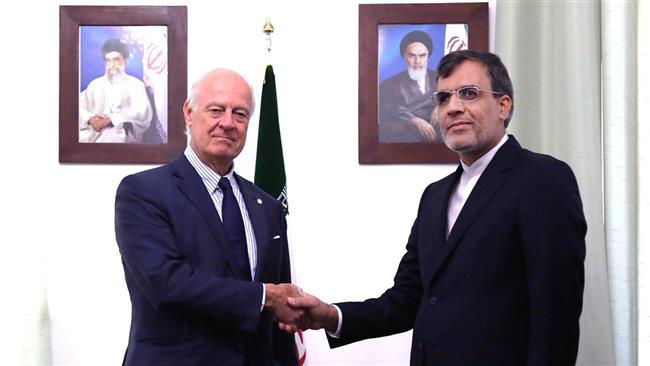
RNA - “We are not trying to take anybody’s place [in Syria]. Regional nations are in charge of their territories and will have control of their countries and the basic principle for the resolution of the crisis in Syria is letting people determine future of their country,” Hossein Jaberi Ansari told reporters following a meeting with United Nations Special Envoy for Syria Staffan de Mistura in Tehran on Monday.
Focusing on Syria, the Iranian official said only Syrian people can determine the fate of their country and “no other player can determine Syria’s fate because a basic principle since the beginning of crisis in Syria has been to oppose foreign intervention and imposition of conditions on the Syrian government and people, and Iran continues to follow up on its policies along the same line.”
Jaberi Ansari then noted that he had held “serious and effective” talks with De Mistura on the Syria peace negotiations and security arrangements, especially in de-escalation zones, which had been agreed upon during the Astana 4 negotiations.
He added that preparations were being made to successfully hold the next round of the Syria peace talks in Kazakhstan's capital, Astana, and the next meeting in Geneva to solve the Syria crisis, end violence and conflict in the country, and stop the killing of Syrians.
On the verge of the Astana talks, Iran along with Turkey and Russia and the UN are making serious efforts to pave the way for an agreement, which would restore security and stability to Syria, he said.
In a Tuesday Facebook post, the Kazakh Foreign Ministry said the next round of the Syria peace talks in the Kazakhstan’s capital may be held in mid-September.
It added that the timing of the talks would be set at a meeting in late August among experts from Russia, Turkey and Iran.
Astana has hosted five rounds of peace talks for Syria since January. Russia, Iran, and Turkey serve as guarantor states in the peace process. The negotiations are aimed at bringing an end to the foreign-backed militancy in Syria, which began in March 2011.
The Astana talks have so far resulted in an agreement on four de-escalation zones across Syria.
According to the Russian Foreign Ministry, three of the enclaves had been created to date in the country’s sprawling central province of Homs and in the Eastern Ghouta area of the southern Rif Dimashq Province, in addition to a southwestern militant-controlled stretch along the border with Jordan.
Jaberi Ansari further stressed the importance of putting an end to the current humanitarian catastrophe caused by terrorists in Syria.
“In order to counter the spread of widespread terrorism and extremism in the region, we seek to open a political horizon for the involved parties so that they would be able to emerge from this situation and experience a new phase of stability and security in Syria and the region,” the Iranian diplomat said.
At Syria’s request, the Islamic Republic has been providing advisory assistance to the country’s army in its fight against Takfiri terrorists.
Iran FM, UN envoy discuss Syria crisis
Meanwhile, in a meeting in Tehran on Monday, Iranian Foreign Minister Mohammad Javad Zarif and the UN envoy exchanged views about the latest developments in Syria and political initiatives to solve the crisis in the country.
De Mistura arrived in Tehran Sunday night to hold talks with senior Iranian officials ahead of the 6th round of the Syria peace talks in Astana.
847/940